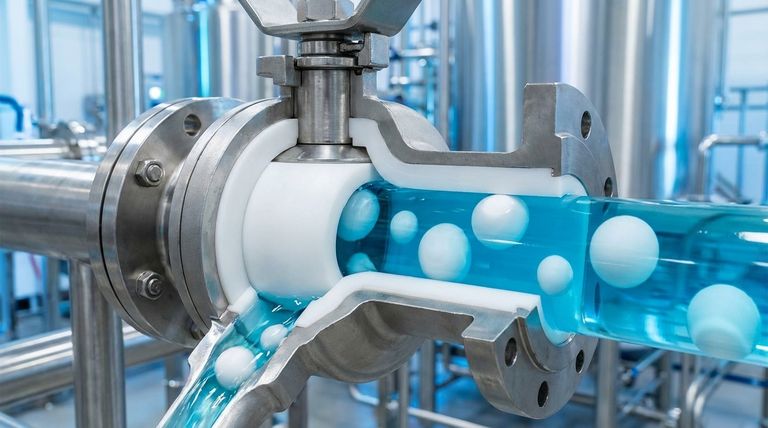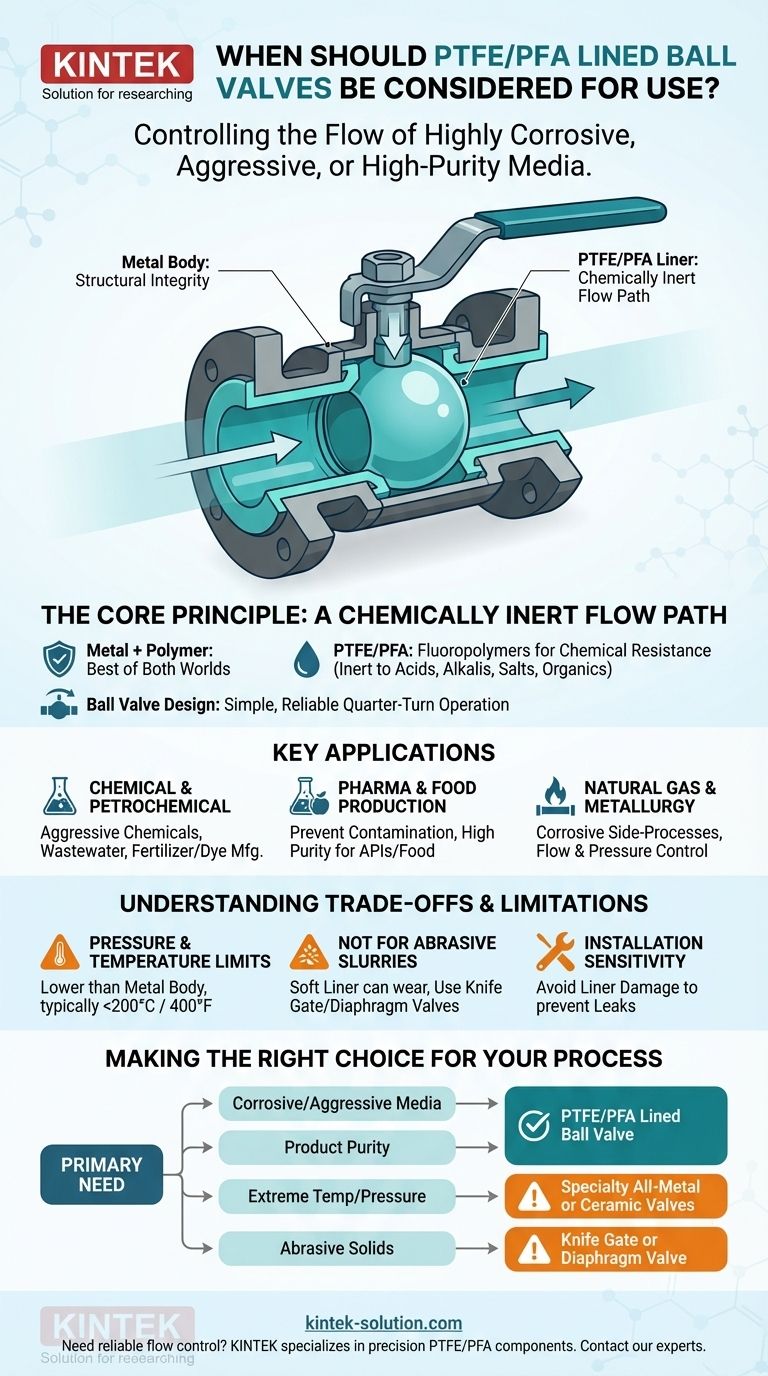To put it simply, you should consider a PTFE/PFA lined ball valve whenever you need to control the flow of highly corrosive, aggressive, or high-purity media. Their primary purpose is to provide a chemically inert barrier between the process fluid and the valve's metallic body, making them a standard choice for applications involving acids, alkalis, and other harsh chemicals.
The core decision to use a PTFE/PFA lined ball valve comes down to a single, critical need: isolating a corrosive or pure fluid from a valve's structural metal components. This design combines the simple, reliable mechanics of a ball valve with the near-universal chemical resistance of a fluoropolymer liner.

The Core Principle: A Chemically Inert Flow Path
To understand when to use these valves, you must first understand their fundamental design. They are not simply valves made of plastic; they are metal valves with a critical internal shield.
What is a Lined Valve?
A lined valve features a strong, metallic outer body (typically carbon or stainless steel) that provides structural integrity and pressure containment.
The inside surfaces of the valve—everything that touches the fluid—are completely lined with a thick, seamless layer of a highly resistant polymer like PTFE (Polytetrafluoroethylene) or PFA (Perfluoroalkoxy).
This construction gives you the best of both worlds: the mechanical strength of metal and the chemical resistance of a high-performance plastic.
Why PTFE and PFA are the Materials of Choice
PTFE and its melt-processible cousin, PFA, are fluoropolymers renowned for their exceptional properties.
They are almost completely chemically inert, meaning they do not react with strong acids, alkalis, salts, or most organic compounds. This is their single most important characteristic.
This inertness also makes them ideal for high-purity applications, such as in the pharmaceutical or food industries, where preventing contamination of the media is just as important as preventing corrosion.
The Advantage of the Ball Valve Design
The ball valve mechanism provides a simple and reliable quarter-turn operation for on/off shutoff.
This straightforward design is mechanically robust and offers excellent sealing performance, ensuring that corrosive media is reliably contained and leaks are prevented.
Key Applications Where Lined Ball Valves Excel
The combination of corrosion resistance and reliable sealing makes these valves essential components in a wide range of demanding industries.
Chemical and Petrochemical Processing
This is the most common application area. Lined ball valves are used to handle the flow of aggressive chemicals, manage wastewater treatment streams, and control reactions in fertilizer, pesticide, and dye manufacturing.
Pharmaceutical and Food Production
In these industries, preventing product contamination is paramount. The non-reactive surface of PTFE/PFA ensures that fluids like juices, dairy products, or active pharmaceutical ingredients remain pure.
Natural Gas and Metallurgy
Even in less obvious sectors, lined valves play a role. They can control flow and pressure in specific corrosive side-processes within larger industrial operations, such as natural gas transmission or metallurgical refining.
Understanding the Trade-offs and Limitations
While highly effective, lined valves are not a universal solution. Understanding their limitations is key to proper selection.
Pressure and Temperature Ratings
The primary limitation of a lined valve is its operating envelope. The PTFE or PFA liner has a lower maximum temperature and pressure rating than the metal body that contains it.
For applications exceeding these limits (typically around 200°C or 400°F), an all-metal valve made from a high-performance alloy may be necessary.
Not Ideal for Abrasive Slurries
While chemically tough, fluoropolymer liners are relatively soft polymers. They can be damaged by abrasive particles or slurries, which can wear away the liner and compromise the valve's integrity.
Installation Sensitivity
The liner is the most critical component of the valve. Care must be taken during installation to avoid scratching or damaging the sealing surfaces, which could create a leak path and lead to premature failure.
Making the Right Choice for Your Process
Your selection criteria should always be driven by the specific demands of your operating conditions.
- If your primary focus is handling aggressive or corrosive media: A PTFE/PFA lined ball valve is often the most reliable and cost-effective choice.
- If your primary focus is maintaining product purity: The chemical inertness of the liner makes it an excellent option for preventing fluid contamination.
- If your process involves high temperatures or pressures beyond the liner's limits: You must evaluate specialty all-metal or ceramic valves designed for those conditions.
- If your media contains significant abrasive solids: Consider a different valve type specifically designed for slurries, such as a knife gate or diaphragm valve.
Ultimately, choosing a PTFE/PFA lined valve is a strategic decision to prioritize corrosion resistance and purity within a defined set of operating conditions.
Summary Table:
| Application Scenario | Primary Consideration | Recommended Valve Type |
|---|---|---|
| Handling strong acids, alkalis, or aggressive chemicals | Corrosion resistance | PTFE/PFA Lined Ball Valve |
| Pharmaceutical, food, or high-purity processes | Product purity and contamination prevention | PTFE/PFA Lined Ball Valve |
| High temperature/pressure beyond polymer limits | Extreme operating conditions | Specialty all-metal or ceramic valves |
| Media with abrasive solids or slurries | Abrasion resistance | Knife gate or diaphragm valves |
Need reliable flow control for corrosive or high-purity applications? KINTEK specializes in manufacturing precision PTFE and PFA components, including custom-lined ball valves for semiconductor, medical, laboratory, and industrial processes. We combine chemical inertness with mechanical strength to protect your systems and products.
Contact our experts today to discuss your specific requirements—from prototypes to high-volume orders.
Visual Guide

Related Products
- Custom PTFE Teflon Balls for Advanced Industrial Applications
- Custom PTFE Parts Manufacturer for Teflon Parts and PTFE Tweezers
- Custom PTFE Parts Manufacturer for Teflon Containers and Components
- Custom PTFE Measuring Cylinders for Advanced Scientific and Industrial Applications
- Custom PTFE Square Trays for Industrial and Laboratory Use
People Also Ask
- What materials are used for PTFE balls? A Guide to Virgin PTFE vs. Filled Composites
- What are the tolerances for PTFE balls based on size? Precision vs. Standard Grade Explained
- What industries commonly use PTFE balls? Essential for Chemical, Pharma, and Food Processing
- What are the properties of Teflon balls? Unlock Elite Chemical & Friction Resistance
- What makes PTFE balls ideal for chemical applications? Unmatched Inertness for Demanding Environments



















